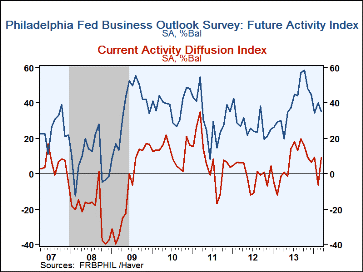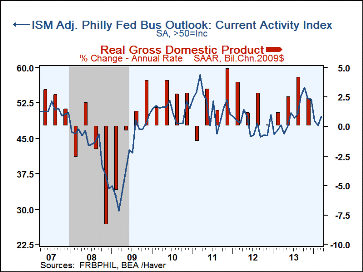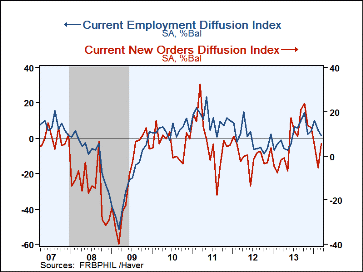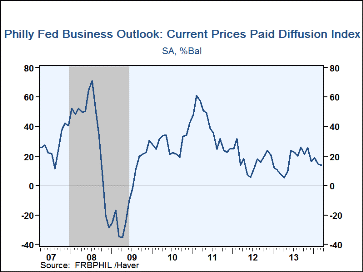 Global| Mar 20 2014
Global| Mar 20 2014Philadelphia Fed Business Conditions Index Improves Sharply
by:Tom Moeller
|in:Economy in Brief
Summary
The Philadelphia Federal Reserve Bank reported that its General Business Conditions Index for March rebounded to 9.0 and made up February's falloff to -6.3. The latest figure surpasses Consensus expectations for 4.0. The seasonally [...]
The Philadelphia Federal Reserve Bank reported that its General Business Conditions Index for March rebounded to 9.0 and made up February's falloff to -6.3. The latest figure surpasses Consensus expectations for 4.0. The seasonally adjusted figure, constructed by Haver Analytics, also moved up to a level of 49.7. It is comparable to the ISM Composite index. During the last ten years there has been a 71% correlation between the adjusted Philadelphia Fed index and real GDP growth.
Rebounds in the new orders, shipments and unfilled orders components led the overall index higher. The employment index, however, fell to its lowest level in nine months. During the last ten years there has been a 79% correlation between the employment index and the m/m change in nonfarm payrolls. Also falling were the delivery time and inventory series.
Pricing power diminished as the prices paid index fell to its lowest level since last May. A lessened 19 percent of respondents paid higher prices and a lower 5 percent paid less. During the last ten years there has been a 71% correlation between the prices paid index and three-month growth in the intermediate goods PPI.
The separate index of expected business conditions in six months reversed its February improvement and fell to nearly its lowest level since May. Deterioration in the new orders, unfilled orders, employee workweek paced the fall while employment, shipments and inventories rose. The future prices paid index improved moderately but the capital expenditures series jumped to nearly its highest level of the recovery.
The survey panel consists of 150 manufacturing companies in Federal Reserve District III (consisting of southeastern PA, southern NJ and Delaware.) The diffusion indexes represent the percentage of respondents indicating an increase minus the percentage indicating a decrease in activity. The ISM adjusted figure, calculated by Haver Analytics, is the average of five diffusion indexes, new orders, production, employment, supplier deliveries and inventories with equal weights (20% each). Each diffusion index is the sum of the percent responding "higher" and one-half of the percent responding "same."
The figures from the Philadelphia Federal Reserve can be found in Haver's SURVEYS database. The Consensus expectations figure is available in AS1REPNA.
| Philadelphia Fed (%, SA) | Mar | Feb | Jan | Mar'13 | 2013 | 2012 | 2011 |
|---|---|---|---|---|---|---|---|
| ISM-Adjusted General Business Conditions | 49.7 | 47.7 | 48.8 | 47.8 | 50.0 | 47.8 | 52.0 |
| General Business Conditions | 9.0 | -6.3 | 9.4 | -1.4 | 6.4 | -0.2 | 7.7 |
| New Orders | 5.7 | -5.2 | 5.1 | -1.9 | 7.3 | -0.1 | 7.2 |
| Shipments | 5.7 | -9.9 | 12.1 | 1.4 | 7.1 | -1.3 | 9.9 |
| Unfilled Orders | 2.6 | -2.6 | -1.0 | -7.3 | -3.8 | -6.5 | -0.9 |
| Delivery Time | -2.7 | 2.9 | -2.8 | -8.5 | -4.0 | -9.1 | -0.4 |
| Inventories | -6.8 | 3.6 | -19.6 | -3.8 | -3.2 | -6.0 | -0.3 |
| Number of Employees | 1.7 | 4.8 | 10.0 | -0.9 | 1.5 | 0.1 | 11.0 |
| Prices Paid | 13.9 | 14.2 | 18.7 | 7.6 | 16.7 | 17.7 | 39.3 |
Tom Moeller
AuthorMore in Author Profile »Prior to joining Haver Analytics in 2000, Mr. Moeller worked as the Economist at Chancellor Capital Management from 1985 to 1999. There, he developed comprehensive economic forecasts and interpreted economic data for equity and fixed income portfolio managers. Also at Chancellor, Mr. Moeller worked as an equity analyst and was responsible for researching and rating companies in the economically sensitive automobile and housing industries for investment in Chancellor’s equity portfolio. Prior to joining Chancellor, Mr. Moeller was an Economist at Citibank from 1979 to 1984. He also analyzed pricing behavior in the metals industry for the Council on Wage and Price Stability in Washington, D.C. In 1999, Mr. Moeller received the award for most accurate forecast from the Forecasters' Club of New York. From 1990 to 1992 he was President of the New York Association for Business Economists. Mr. Moeller earned an M.B.A. in Finance from Fordham University, where he graduated in 1987. He holds a Bachelor of Arts in Economics from George Washington University.
More Economy in Brief
 Global| Feb 05 2026
Global| Feb 05 2026Charts of the Week: Balanced Policy, Resilient Data and AI Narratives
by:Andrew Cates










